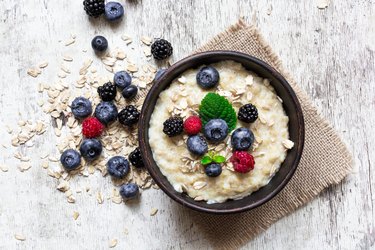
Quaker Oats Company, a member of PepsiCo as of 2001, first introduced Quaker Instant Oatmeal in 1966. Oatmeal is made from oats, one of the most nutrient-dense and healthiest grains you can eat. Oatmeal is gluten-free, a good source of protein and rich in carbs and fiber. Essential vitamins and minerals are a big bonus to Quaker instant oatmeal nutrition content, which helps to promote heart health and general well-being. The USDA Dietary Guidelines recommends eating at least three servings of whole grains daily, such as those in oatmeal, as they may help to decrease the risk of heart disease.
Ingredients in Instant Oatmeal
Video of the Day
Besides whole grain oats, ingredients in Quaker oatmeal includes oat flour, calcium carbonate, salt, guar gum, caramel color, reduced iron and vitamin A palmitate, according to USDA Branded Food Products Database. The calcium carbonate contributes to the source of calcium in oatmeal. Guar gum is a water-thickening agent similar to cornstarch used to thicken the oatmeal after adding water.
Video of the Day
How Much in a Serving
Each box of Quaker Instant Oatmeal contains eight pouches. Nutritional information is based on a single-serving size packet equal to 28 grams. Quaker oatmeal packets comes in a variety of flavors, including Original, Maple Brown Sugar oatmeal, Apple & Cinnamon, Cinnamon Roll, Cinnamon & Spice, Raisin and Spice, Raisin, Date and Walnut, Strawberries and Cream and Peaches and Cream. For the purpose of the following nutritional breakdown, the original version of Quaker Oats Instant Oatmeal is used.
Low Cholesterol, Low Fat
Quaker oatmeal contains no cholesterol and is low in saturated fat, so it is heart healthy. The number of calories in Quaker oats is 100, with 20 calories from fat. The fat in Quaker oats includes .5 grams of saturated fat, .5 grams of polyunsaturated fat, .5 grams of monounsaturated fat and 0 grams of trans fatty acids, according to USDA Branded Food Products Database. A single serving only contributes to 3 percent of the daily value (DV) of total fat based on a 2,000 per day calorie diet.
Fiber for Digestion
Oatmeal contains both insoluble and soluble fiber. WebMD suggests that fiber, particularly soluble fiber, helps to maintain stable blood sugar levels by slowing down the process of digestion. Oatmeal also satisfies hunger, making you feel fuller and possibly contributing to weight loss. One serving of Quaker instant oatmeal contains 19 grams of total carbohydrates, providing 6 percent daily value, with 3 grams of dietary fiber, providing 11 percent daily value, based on the National Academies Food and Nutrition Board chart. The USDA Dietary Guidelines recommends eating at least three servings of whole grains daily, as they may help to decrease the risk of heart disease. Fiber helps to slow the absorption of sugar, keeping blood glucose levels stable.
Protein for Energy
A 28-gram serving of the oatmeal provides 4 grams of protein, according to USDA Branded Food Products Database. Protein is necessary for the maintenance of your muscles, organs, skin, hair, nails and bones. Since oats have more protein than any other grain, according to Healthline, Quaker oatmeal is a good choice for providing energy from your morning meal.
Vitamin A and Minerals
Quaker instant oatmeal is fortified with vitamin A palmitate so it's a good source of the fat-soluble vitamin A, which is important for normal vision, the immune system and reproduction. Fat soluble vitamins are stored in the body for future use. Quaker oatmeal contains 750 IU of Vitamin A per serving, which will contribute 25 percent of the daily value, says the Quaker Oat Company.
Iron is necessary for normal growth and development, cellular function and production of hemoglobin. The iron content in a single serving of oatmeal provides you with 40 percent of you recommended daily intake, with 7.2 milligrams. Other minerals in oatmeal are 100 milligrams each of calcium, phosphorus and potassium, and 32 grams of magnesium.
- Quaker Oats: Discover the Extraordinary Benefits of Quaker® Oats
- Food and Nutrition Board
- USDA Branded Food Products Database: Quaker Instant Oatmeal Original
- USDA Dietary Guidelines: Key Elements of Healthy Eating Patterns
- Livestrong.com: Easy, Savory Oatmeal Recipes for Any Time of Day
- Livestrong.com: Blood Glucose
- Livestrong.com: List of Whole-Grain Carbs
- Livestrong.com: How Are Fat-Soluble Vitamins Absorbed?
- MyFitnessPal: Calories in Quaker Instant Oatmeal- Original
- Livestrong.com: Health Problems from Calcium Carbonate
- WebMD High-Fiber Diet May Fight High Blood Pressure
- HealthLine: 9 Health Benefits of Eating Oats and Oatmeal